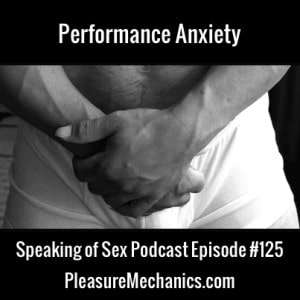Podcast: Play in new window | Download

Mindful Sex May continues with an exploration of what mindful sex practices can offer men struggling with performance anxiety. This is one of the most common sexual struggles for men – you finally have the opportunity to be sexual with a partner, you start to get aroused, and then… worry, anxiety, fear and/or panic start to set in! Anxiety is the enemy of arousal – so what can you do to interrupt the pattern of performance anxiety?
Join us in exploring the practices of Mindful Sex – enroll in our online course, join the community of pleasure explorers and start practicing these simple yet powerful practices with us.
For a complete online sex therapy program specifically about performance anxiety, we highly recommend Vanessa Marin’s Modern Man’s Guide To Conquering Performance Pressure
Podcast Transcription For Podcast Episode: Mindful Sex For Men With Performance Anxiety
Podcast transcripts are generated with love by humans, and thus may not be 100% accurate. Time stamps are included so you can cross reference or jump to any point in the podcast episode above. THANKS to the members of our Pleasure Pod for helping make transcripts and the rest of our free offerings happen! If you love what we offer, find ways to show your love and dive deeper with us here: SHOW SOME LOVE
Chris Rose: 00:00 Welcome to Speaking Of Sex With The Pleasure Mechanics. I’m Chris.
Charlotte Rose: 00:04 I’m Charlotte.
Chris Rose: 00:06 We are the Pleasure Mechanics and on this podcast we have soulful and explicit conversations about every facet of human sexuality. Come on over to PleasureMechanics.com where you will find a complete podcast archive. While you are there go to Pleasure Mechanics.com/Free and enroll in the Erotic Essentials, our free online course, so you can get started right away with some of our best strategies and techniques for more pleasure in your life.
Chris Rose: 00:42 Hello. Welcome to the second episode of our Mindful Sex May series. This month we’re exploring different facets of mindful sex, different applications of these techniques and these practices. Today we want to focus on mindful cock. The mindful cock.
Chris Rose: 01:04 How can we unify mindfulness and presence and paying attention with the experience of the beloved penis and bring that penis to sexual experiences with joy and freedom and excitement and reveling in all of the pleasure penises can bring and receive and get rid of some of this penis anxiety that hangs so heavy over so many of us? There’s so much cock anxiety when you think about it. It’s a lot for that tender little organ to bear. You know?
Charlotte Rose: 01:42 It is. I think there’s so much and I think that a lot of men don’t know that because it’s such an isolating experience.
Chris Rose: 01:49 [crosstalk 00:01:49].
Charlotte Rose: 01:49 They don’t realize that other men are having such a similar experience and so many of them.
Chris Rose: 01:55 Yeah. All of them.
Charlotte Rose: 01:57 I think there’s some comfort to knowing that that you’re not alone in having some stress and anxiety and possibly some depression around having an erect penis and having it do what you want when you want it to do it and if it doesn’t then you feel like a failure. All of that is a very common experience.
Chris Rose: 02:14 Again, we’re going to highlight that the experience of anxiety and the struggle and the angst about it is not really about the experience of the penis. It’s much more about the cultural meaning and the emotional significance of what the penis is doing or not doing.
Chris Rose: 02:37 Just notice that. Notice how much of your struggle with your penis or with your partners’ penises how much of that struggle is about the actual what happens versus the meaning you’re assigning to what happens. There might be a very big chasm there.
Chris Rose: 02:55 To paint the picture a little more of what we’re talking about some penises have medical issues. Right? Some men have medical issues that affect their penises, circulation issues, hormone issues. There is a subset of penis issues that are quite medical in nature and that need medical attention and attention to your whole system, your cardiovascular health, your hormonal health.
Chris Rose: 03:21 If your penis function feels like it’s changing across the board, like how your penis functions in the morning, during masturbation, during partnered sex, kind of during all different conditions, if the erectile function, if the ejaculation function, if the urinary function … Like if something the penis is supposed to do it doesn’t do helpfully or if there’s pain during those functions that’s when you go to a doctor.
Chris Rose: 03:51 Many, many, many more of the struggles around the penis are conditional struggles. Meaning you can get erect and have an ejaculation that is satisfying during masturbation but not with your partner or with some partners but not other partners or during certain conditions and not other conditions.
Chris Rose: 04:13 When the penis function is conditional then we look to the psychological, emotional, social underpinnings of … It’s not the penis hydraulics that aren’t functioning. Right? It’s not the ejaculatory function that’s not functioning. There’s something in the whole system, the sexual system, that is going a little haywire.
Chris Rose: 04:37 This is why mindfulness can be such an amazing intervention for men, such an amazing practice, a training ground to rewire and reprogram their sexual system to create different outcomes. We’re going to engineer this mofo, right?
Chris Rose: 04:55 Dr. Lori Brotto, who is the leading researcher on mindful sex from the clinical applications of mindful sex, has for the past decade plus been focusing primarily on women, almost exclusively on women and their sexual experience, and having phenomenal results in her clinic. I will link in the show notes page to an interview with her.
Chris Rose: 05:17 She is now doing research on the application of mindful sex techniques for men and for premature ejaculation, for erectile dysfunction, for sexual performance after prostate surgery are the three main categories she is looking at and we are so excited to talk to her in a few months about what she finds in her research.
Chris Rose: 05:40 Let’s talk about how this might show up for men.
Charlotte Rose: 05:44 They just did a very small study to prove that it was a good idea to keep studying it and they found that the results of using mindfulness with men was very effective in the same way that it has been with women. It’s probable that they will find that it is awesome for men and I’m going to assume that it is but we will look forward to those studies.
Chris Rose: 06:04 We’re not doing like scientific research prediction here.
Charlotte Rose: 06:07 No.
Chris Rose: 06:09 Well, we have many data sets, right? We have also the data from all of the men in our mindful sex course who are reporting awesome successes and the most important data set, the only research that really matters for you, dear listener, is your research. It’s figuring out if any of these strategies and practices can help you struggle less and enjoy your sex more.
Charlotte Rose: 06:34 Yes. That is what we’re looking for.
Chris Rose: 06:38 Maybe that’s a good way to think about what we’re doing here because we’re not just going for this mind blowing 10 hour orgasm overnight kind of promise. We are going for less struggle, more pleasure. Less isolation, more connection. Less fear, more confidence.
Chris Rose: 06:58 How might mindful sex be a really useful tool if you experience situational erectile dysfunction … I don’t even like the word dysfunction. If you can’t always … If your penis doesn’t always do what you want it to do. That’s not even … This is the whole thing. All of the setups for men like erectile dysfunction means if it’s not erect it’s dysfunctioning.
Charlotte Rose: 07:21 Yeah. It’s not really fair.
Chris Rose: 07:23 Premature ejaculation is like ejaculation before you wanted it. Since when do we order our bodies around to do what we want them to do when we want them to do it?
Charlotte Rose: 07:33 Often but it’s not a good idea.
Chris Rose: 07:34 It’s all a setup. Just notice this. Even the language around the penises, how we think about penises and penis function, is a complete setup. It’s like if you’re not erect you are wrong and you are therefore less of a man, therefore your worth is devalued, therefore go crawl in a hole and die.
Charlotte Rose: 07:52 Oh my God. It’s so dramatic but I think [crosstalk 00:07:55].
Chris Rose: 07:54 It’s so fucking true, though. These are the emails I get all the time from men and they are good husbands, they are good partners, they’re great dads, they’re great at work. They’re like showing up in their life, they’re trying their best, and then when they can’t get an erection when they are a little bit aroused we slap them down and tell them that they’re lesser than.
Chris Rose: 08:12 It’s so cruel. I get really worked up about this. There’s so much cruelty done onto men’s sexuality that hasn’t yet been named, that hasn’t yet been unpacked. We’ve been spending the past 50 years looking at and talking about the sexual oppression of women and it’s time we talk about how this is impacting men because men are struggling, they are hurting, and they need support and they also need solidarity. Right?
Chris Rose: 08:38 The main message here, guys, is you are not alone. If your penis doesn’t always pop to attention, if it gets erect when it’s not supposed to get erect, when it doesn’t get erect when you kind of want it to, when you have ejaculations too quickly or not at all.
Chris Rose: 08:55 One way we can think about all of this it’s a mismatch between what you might be feeling and experiencing and how your genitals are behaving. This is arousal nonconcordance because so much of how this shows up is you have a sexual partner or you’ve worked really hard to get the attention of a sexual partner. You do a lot of effort to create a sexual opportunity. A sexual opportunity comes and you balk. You freak out.
Chris Rose: 09:26 A lot of the guys I talk to it’s like they can anticipate sex, they get horny, they can masturbate while fantasizing about fucking someone, and then at the time where they have a possibility, they have a receptive partner, someone is hitting on them, their wife is finally in the mood, they freak the fuck out and that anxiety loop then completely hijacks their neurology, their body, their physiology, and the penis doesn’t play. The penis doesn’t join the play in a way that we have taught men is necessary for their sexual pleasure.
Chris Rose: 10:06 There’s so many things to break down here, right? We can start at the end and say your erection is not necessary for sexual pleasure. We did a great episode recently about soft penis pleasures and all the ways you can enjoy a soft penis. We can start there but we also need to start at how can you show up for an arousing situation, receive that arousal, build that arousal, and not freak out and not spin into anxiety.
Chris Rose: 10:34 This is the main intervention of mindful sex. That’s amazing for all of us. I think it’s going to be rocket fuel for so many men to learn how to build arousal without getting anxious.
Charlotte Rose: 10:46 Because that’s what happens. You’re in an experience with a partner and you start feeling aroused and you feel those sensations in your body and then you start feeling nervous and anxious about what’s going to happen in the future and how is your erection going to be and is it going to stay and then you’re focusing all your attention on those thoughts and your erection starts to disappear.
Charlotte Rose: 11:08 That is what we want to support you in shifting. What we want to do is learn how to be aroused and feel the experience of arousal in our body while calming our thoughts, calming our mind, and being able to focus all of our attention on the sensations in your body of arousal.
Charlotte Rose: 11:30 Eventually over time the experience of arousal is not anxiety-producing. You can genuinely spend all of your attention focusing on how good it feels to be aroused and not be worrying about your erection. That is a process. That is a practice. There are things that we can do to cultivate that experience.
Chris Rose: 11:50 Well, and that you can stay aroused, stay in high states of arousal, and your erection will come and go and that’s okay. Right? When we think about the model of staying relaxed and aroused … Blood will flow in and out of the penis and there will be the full mast, half mast, all sorts of situations, but as you move dynamically through the sexual experience it will become less and less important and you experience pleasure in your whole body and your attention isn’t just on, “How hard am I? How can I thrust fast enough to get an ejaculation before I lose this erection?”
Chris Rose: 12:30 That kind of sprint is what a lot of men get into. It’s like, “I’m hard. I have the opportunity. Let’s go. Let’s do this.” That is not a great formula for sexual partners always.
Charlotte Rose: 12:42 For connection because you’re so focused on reaching the finish line, the imaginary finish line.
Chris Rose: 12:47 Right. You might be rushing your partner who is there and excited but needs way more time to warm up and then can get to the fucking. It puts a lot of pressure on that erection and it creates this thing of like if the erection goes away or if I ejaculate this opportunity is over.
Chris Rose: 13:05 I’ve been reading an article by an Olympian silver medalist who is coming out with a book about performance anxiety and erectile dysfunctions. We’re hoping to bring him on the show and talk really deeply about this.
Chris Rose: 13:21 One of the things I noticed is the juxtaposition between performance and athletic performance and competition that is so built into masculinity and how then a sexual opportunity becomes an opportunity to win or lose and that you kind of are self-scoring before you’re even get started. You’re worried about that winning and losing, you’re worried about where you are on that ranking card. Men are so like, “How do I compare to your other partners? Was he better than I?” That competition that’s built into the male ego …
Charlotte Rose: 13:56 Which we’re trained to do. That is not …
Chris Rose: 13:59 Right. It’s not because you’re an egotistical bastard. It’s because this is like your programming. Then women are trained to evaluate themselves on sexiness and desirability and how their body looks. Right?
Chris Rose: 14:11 We drop into a moment with a couple whose into each other, they want to fuck. His erection goes down, he has lowered his score, he feels like a failure, she feels like that erection is some reflection on her, she feels like a failure, and now they have to reconcile that failed sexual moment.
Charlotte Rose: 14:29 Yeah. It’s a downward spiral.
Chris Rose: 14:31 How familiar does this feel to you? How familiar does this scenario feel? I think it’s really, really common. Then there’s versions of this. There are a lot of strategies here. How does mindful sex fit into this?
Chris Rose: 14:45 Mindful sex is going to give you the strategies and the techniques so that you can first notice the patterns in your sexual response system, you notice the anxiety scripts, you notice what starts happening, and in that noticing there is so much opportunity because then you can start intervening, interfering with that script, choosing a different script earlier and earlier.
Charlotte Rose: 15:11 Part of what you get to do is begin to pay attention to what your first early signs of feeling anxiety or feeling stress as you’re getting aroused are. You have to be your own detective and figure that out and really pay attention to what your body does, what your mind does, what your thoughts are that start putting you into an unsavory loop.
Chris Rose: 15:33 We have tools to help you do that in the mindful sex course so you’re not on your own being a detective and you’re learning together also in community about the common patterns so you can start being, “Oh, yeah. That makes sense to me.” Then what happens when you’ve established these scripts and patterns where does the opportunity come?
Charlotte Rose: 15:54 Then you can begin to interrupt those thoughts, you can notice those thoughts, and replace them with different thoughts, which can then have a different outcome. You begin to train your mind to shift your attention where you want it to go instead of where it goes on autopilot.
Charlotte Rose: 16:13 We tend to think of those thoughts as real, as real truth, and sometimes they aren’t real truth. They are just programmed thoughts. When we begin to shift them to something more desirable it has an impact on our body and our body’s experience.
Chris Rose: 16:31 Then you start creating the opportunities for yourself to have different experiential outcomes. That’s when the secret sauce happens when your body experiences a different option, when your body experiences the opportunities to have relaxed arousal without a focus on the outcome and gets to feel how pleasurable that is, how joyful that can feel. You start reprogramming your neurology.
Chris Rose: 17:00 One of the fancy words for this is positive neuroplasticity. There’s a neuroscientist Buddhist teacher I’ve been really learning a lot from recently and he talks about this as installing the good. We’ll talk more about this in a future episode.
Chris Rose: 17:16 The important thing here is that when we have positive experiences we have to focus on them and tell our body to take it in as an option. Our brains are threat tracking monsters. The human brain is really good at threat tracking, at looking for the potential problems to solve.
Chris Rose: 17:40 One of the skills of mindful sex we learn to bring here is paying attention to what is in a more neutral way so we don’t project all of our anxiety and fears into the current moment.
Chris Rose: 17:55 There’s an opportunity here for open dialog with your partner where you have a conversation ahead of time, “If I don’t get an erection that stays erect for the entire time we’re playing it’s not because I don’t find you desirable. It’s something my body is doing right now. I just want to let you know ahead of time.” You pregame it and you set expectations differently. That can be a strategy.
Chris Rose: 18:18 If we go back to the juxtaposition of athletic performance and sexual performance one of the strategies we can think about here is practicing for the big event. One of the things that gives us confidence and skills to enjoy … If we even take off winning and losing, right? I don’t want to continue that performance metaphor but what helps you enjoy game day? What helps you enjoy your hobbies? It’s practicing and developing skills so you can be in the flow.
Chris Rose: 18:52 Whether that’s soccer or woodworking, I always go back to woodworking, whatever your skill is, we all know that by putting in practice and developing skills individually it helps us enjoy a flow state, an experience of something else. You put in the practice to experience the thing. We can break down so many hobbies this way.
Chris Rose: 19:18 Mindful sex gives us a set of practices, a set of strategies, a set of skills to work out, to practice with, to literally develop skills. This word practice can start feeling woo woo. Like, “What’s your erotic practice?” We’re literally practicing skills. It’s no different than dribbling a basketball. You’re practicing embodied erotic skills so that when your wife is looking at you and wants to connect and your penis is soft and you don’t feel good about that you have a whole suite of skills to deploy that allow you to stay in that present moment, look your wife in the eye, and enjoy whatever erotic opportunity is available for you.
Chris Rose: 20:07 Cumulatively, if we can stay present for all of those erotic opportunities, whether it’s the tender kiss on the shoulder before you roll over and go to sleep but you can really feel that kiss and be present to it and what it meant to the wildest of sex you can imagine. Right? That whole range of staying present for erotic opportunities, paying attention to them, feeling them fully, letting them in, that’s what your lifetime of sex is made of. It’s not the one Olympic performance. Right?
Chris Rose: 20:40 How do we develop the skills to stay present and available for the cumulative experience of being an erotic human? That’s what we’re practicing for. When it comes to the cock it’s about realigning the cock with the full man behind it so your penis gets to play with your full presence behind it and your penis isn’t this separate thing. We often treat it, it’s like this dangling, “Oh, it’s got a head of its own.” It’s this like dangling thing.
Chris Rose: 21:15 We’ve disembodied men from their penises. We treat them like they’re this demon beast that needs satisfying. You know? I don’t know. We have such weird narratives about the penis and how do we just treat the penis as a beautiful organ of pleasure that can give and receive so much pleasure, that’s fascinating and mesmerizing in its ability to change.
Chris Rose: 21:38 We need whole new dialogs about the cock. We need men who are willing to embody their cocks as lovers fearlessly and without shame and from this place and then tell other men what is possible and tell men about the internal penis and the pleasures of the internal penis and the pleasures of being penetrated. You’ve gotten me started.
Chris Rose: 22:02 Yeah. I get really excited about this, I get really fiery about it, because a lot of men confide in me and I suspect have conversations with me they’re not having with a lot of other people and this has been over the past 20 years. I have this sense of what men are struggling with and how men are treated in bed and how men treat themselves sexually. Like what men give themselves permission for and how men feel about their penises.
Chris Rose: 22:34 I’ve also been in erotic community. I’ve been with men who were fearless sexual explorers, who have devoted their life to sexual adventure. I’ve been inside so many men. I’ve had so many cocks in my hands, we have together, that we also know what is possible for men.
Chris Rose: 22:51 We have seen men in fully unbridled sexual power and it’s fucking gorgeous. This world needs more. I think there’s this sense of we need less of men’s sexuality right now and we don’t. We need more of men’s authentic, empathetic, emotional embodied sexuality because it’s fucking gorgeous and sexy and hot and beautiful and powerful and motivates men to do great work in the world and show up for their communities.
Chris Rose: 23:23 We all need this sexual liberation healing we’re talking about. This is not just for pussies. What does the liberated cock look like? We need to start painting a picture of what men’s sexual liberation will look like and what that will bring to women.
Charlotte Rose: 23:42 Part of what that looks like is men being in relationship with their own cock. This narrative of the cock has a mind of its own and you just have to follow your cock because you have no control over it. That is where men’s sexuality gets so messy.
Chris Rose: 24:03 Or that the cock is used to prove a point.
Charlotte Rose: 24:03 And dangerous. Yes.
Chris Rose: 24:06 The cock is used to prove your power. I mean, we’re getting into a whole other conversation here about …
Charlotte Rose: 24:10 But a responsible and mindful cock is when a man has a relationship with his own cock where he can know what it needs and he’s responding to it and he’s also being kind to himself, not talking badly, poorly to himself or his cock, but has a generous spirit with himself and has practices where he is able to cultivate that power. He is not letting it run away or prove a point but is letting it respecting his sexuality and his desire and his eroticism and giving it space but also cultivating it and communing with it and …
Chris Rose: 24:59 We’ve officially gone off the deep end. You just got a big honking laugh. With that, we really want this to be an invitation to all of you. You know, again, we’ve been getting emails recently about gendered language and more and more listeners want us to strip all of this gendered language out and talk about … We do. We talk about bodies. All of this comes back to the human body, the human experience of sexuality, of showing up for one another.
Chris Rose: 25:31 In this episode we’ve really been talking about cocks and people who are socialized as men and this male masculinity script that you’ve been given and that have led so many of you to a specific set of sexual experiences and a specific relationship with your penis and what it means about your masculinity and the performative, competitive relationship you have with your sexuality.
Chris Rose: 26:01 We can highlight these specific experiences and we can talk about the different socializations of men and women but ultimately these practices serve us all and they are amazing practices for human bodies, whether or not you’re in a sexual relationship right now, whether you’re queer or straight, however you identify, the mindful sex practices can serve you.
Chris Rose: 26:25 We really want these practices to be available and accessible. We have put them all in our mindful sex online course. There is special podcast pricing going on now at Pleasure Mechanics dot com slash Mindful that will take you directly to enrollment.
Chris Rose: 26:41 Enrolling in an online course means you have access to this resource library but it also means an investment, a commitment, for you to practice, to try things out, to let us into your erotic life in a deeper way, to try our techniques, to try our strategies, and see what changes for you.
Chris Rose: 27:04 Stepping into an online course as much as it’s, yes, unlocking new resources, it is stepping into an experience and then we are there to guide you along. We are there for you to shoot an email to being like, “This is what happens. It felt weird. What do you think?” I will be there for you with personalized coaching.
Chris Rose: 27:24 It’s a way we can make these techniques available to people all around the world at a really affordable way. That is why we do all of this work online. Pleasure Mechanics dot com slash Mindful. Join our mindful sex online course.
Chris Rose: 27:40 Then we’re thinking about traveling so go to Pleasure Mechanics dot com slash Live to tell us if you could join us in Los Angeles this August or if not in Los Angeles where would you like to meet us? We have wonderful responses coming in. It looks like we have a very busy travel schedule for the next 20 years.
Charlotte Rose: 28:00 Awesome.
Chris Rose: 28:01 Let us know where you are. If you’d like to come out to a live workshop experience with us go to Pleasure Mechanics dot com slash Live. The truth is many, many more of you will meet us online, join our online courses, do these practices in the privacy of your own home, feel the results of them in your own body, in your own relationships, report back to us.
Chris Rose: 28:27 We will continue to deliver you amazing resources to take you deeper into your erotic experience and together we have thousands of people gathered together into this online school all asking the question, “How can I experience more sexual pleasure in my life? How can I feel less struggle and more joy around my sexuality? How can we do this through daily practice through making incremental changes that have huge profound results?”
Chris Rose: 29:00 After 10 years we now have a community of people who have been making these changes, couples who are in totally new places, and that is feeling so exciting for me to have been working with people now for over a decade.
Chris Rose: 29:15 Join us. Pleasure Mechanics dot com is our online home. You’ll find it all there. Pleasure Mechanics dot com slash Mindful to enroll in the mindful sex course and join us for this Mindful Sex May and beyond. Yes. I’m Chris.
Charlotte Rose: 29:31 I’m Charlotte.
Chris Rose: 29:32 We are the Pleasure Mechanics.
Charlotte Rose: 29:33 Wishing you a lifetime of pleasure.
Chris Rose: 29:37 Manifested through daily practices. We’ll see you next time on Speaking Of Sex With the Pleasure Mechanics. Cheers.




